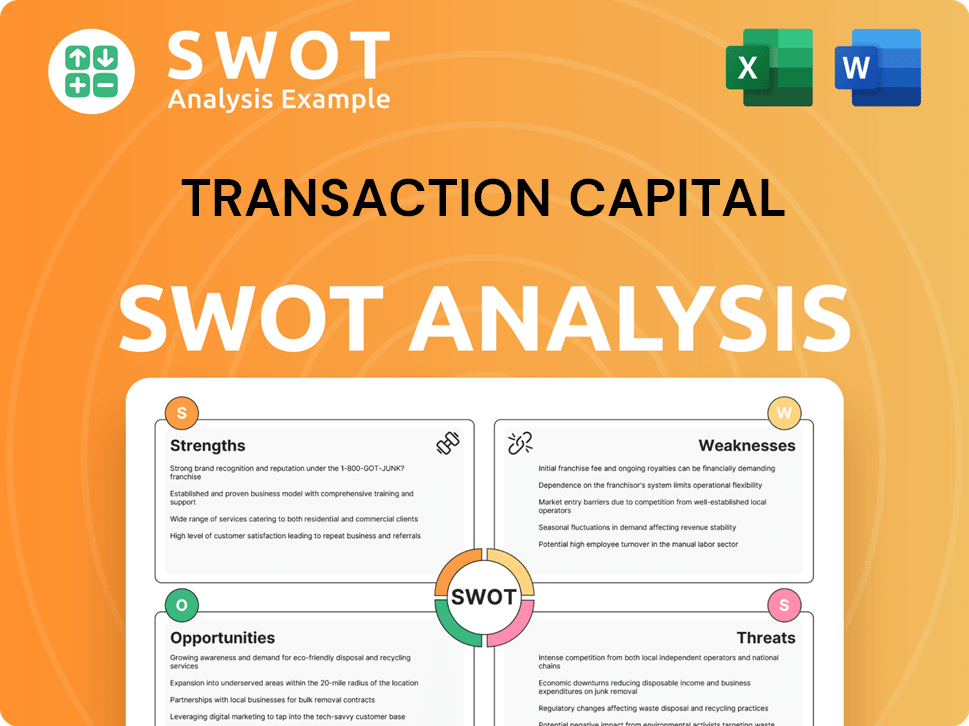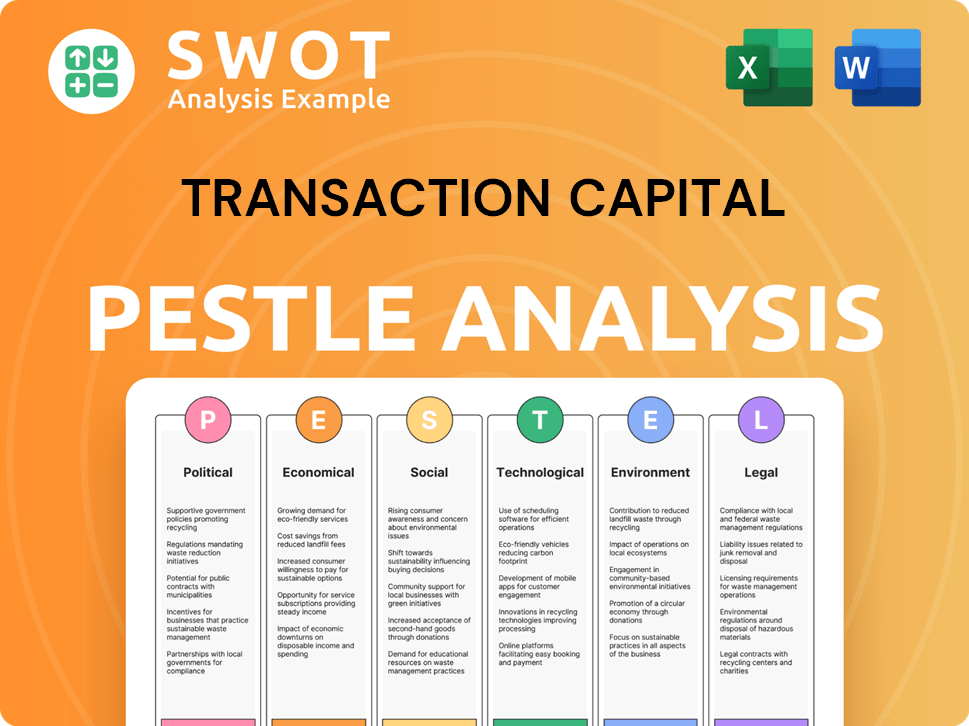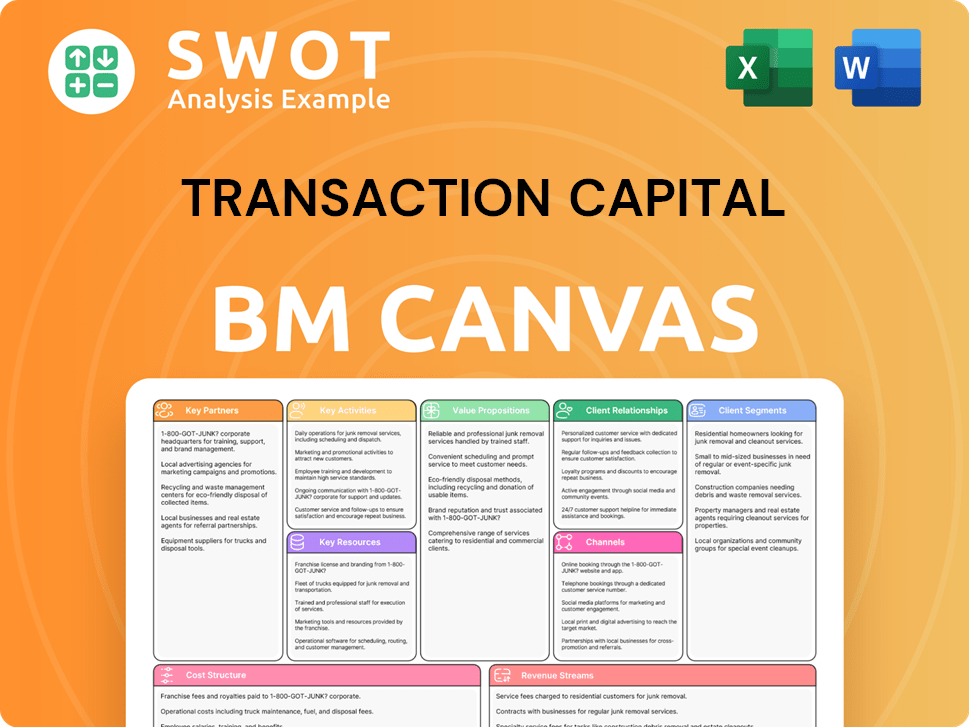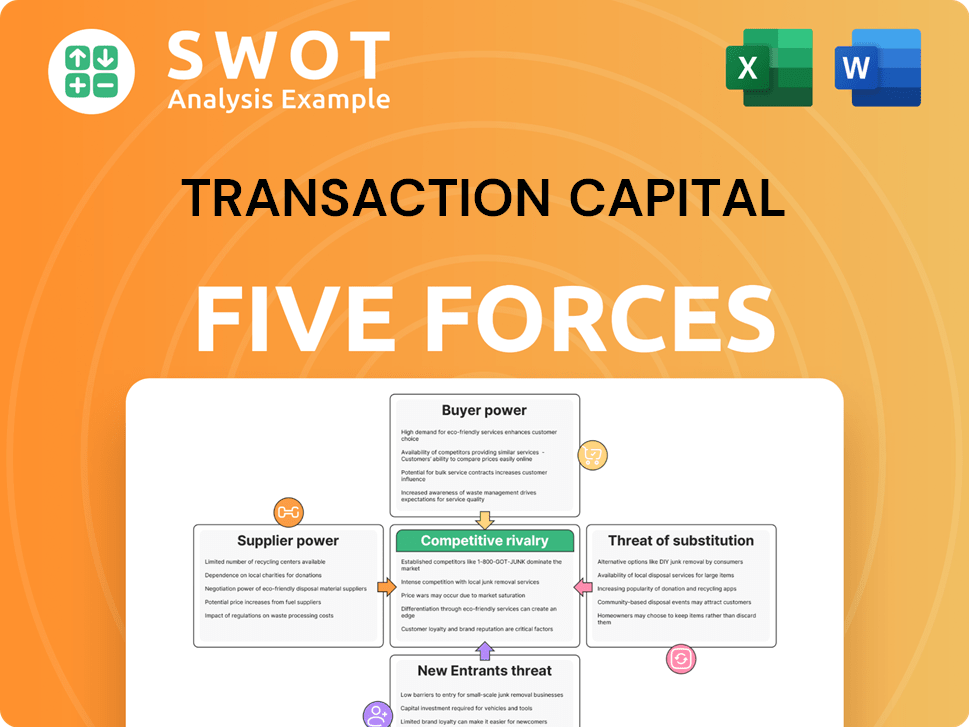Transaction Capital Bundle
Who Really Controls Transaction Capital?
Unraveling the Transaction Capital SWOT Analysis is crucial, but understanding its ownership is equally vital. The recent unbundling of its WeBuyCars stake signals a pivotal moment, making the question of who owns Transaction Capital more pertinent than ever. This South African investment holding company's strategic direction is intrinsically linked to its ownership structure.

Understanding the dynamics of Transaction Capital ownership is key to assessing its future. The company's financial performance, including its reported losses in recent fiscal years, highlights the importance of examining its shareholder base. This analysis will explore the evolution of Transaction Capital ownership, including its major investors and how the company's structure impacts its strategic decisions. Furthermore, we will delve into the influence of key stakeholders on the company's resilience and future prospects, providing valuable insights for anyone interested in Transaction Capital stock, or its subsidiaries.
Who Founded Transaction Capital?
The story of Transaction Capital begins in 2007, born from the merger of four companies: MBD, CMS, SA Taxi, and Principa, along with Paycorp. This strategic combination laid the foundation for a financial services powerhouse. Understanding the early ownership structure is key to grasping the company's trajectory.
The founders, Jonathan Jawno, Michael Mendelowitz, and Roberto Rossi, have been central to Transaction Capital's journey. Their sustained involvement and significant investments highlight their commitment to the group's long-term vision. Their deep experience in the financial services sector, dating back to the 1990s, has been crucial to the company's strategic direction.
While specific initial equity splits aren't publicly detailed, the founders' continued presence and substantial investment underscore their foundational control and vision for the group. This early ownership structure has shaped the company's culture and strategic decisions.
Jonathan Jawno, Michael Mendelowitz, and Roberto Rossi are the key founding members. They have remained actively involved and significantly invested in the business since its inception.
The founders' initial equity splits are not publicly detailed. However, their continued involvement and investment signal their foundational control and vision for the group.
Pilatucom Holdings Limited is the vehicle through which the founders hold shares. In 2020, they sold 69 million shares through this vehicle.
As of March 2023, the founders, through Pilatucom Holdings Limited, held 109 million shares. This increased to 112 million shares after further purchases in March 2023.
The founders' continued active directorship and commitment reflect their long-term vision for building a significant group. This is evident in their sustained involvement.
The founders have extensive experience in the financial services sector. They have been active in these market segments since the 1990s, bringing valuable expertise to Transaction Capital.
The founders' strategic decisions and long-term commitment are crucial to understanding Transaction Capital's ownership structure. The Transaction Capital ownership has evolved over time. In 2020, the founders, using Pilatucom Holdings Limited, sold 69 million shares in a R1.6 billion bookbuild. Despite this, they maintained a significant stake. As of March 2023, they held 109 million shares, which increased to 112 million shares following further purchases. This continued investment and active leadership from the founders highlight their ongoing commitment to the company. For more insights, you can explore the Marketing Strategy of Transaction Capital.
Key facts about the founders and early ownership of Transaction Capital:
- Founded in 2007 through a merger.
- Key founders: Jonathan Jawno, Michael Mendelowitz, and Roberto Rossi.
- Extensive experience in financial services since the 1990s.
- Pilatucom Holdings Limited is the vehicle for the founders' shares.
- Sold 69 million shares in 2020.
- Held 112 million shares as of March 2023.
Transaction Capital SWOT Analysis
- Complete SWOT Breakdown
- Fully Customizable
- Editable in Excel & Word
- Professional Formatting
- Investor-Ready Format

How Has Transaction Capital’s Ownership Changed Over Time?
The ownership structure of Transaction Capital has evolved since its listing on the Johannesburg Stock Exchange (JSE) in June 2012. As of December 2024, institutional investors hold a significant portion of the company's shares, approximately 56%, indicating their considerable influence on the company's stock. The top six shareholders collectively own 53% of the company, demonstrating a concentrated ownership base. Understanding the dynamics of Transaction Capital ownership is crucial for investors and stakeholders alike.
The unbundling and separate listing of WeBuyCars (WBC) on the JSE in early April 2024 significantly impacted the ownership structure. Transaction Capital previously held a 49.9% non-controlling stake in WeBuyCars, acquired in 2020. This stake was later increased to 74.2% by September 2021. Following the unbundling, Transaction Capital no longer holds any shares in WeBuyCars. This strategic move was influenced by pressures on other parts of Transaction Capital's business, particularly SA Taxi, leading to asset sales to manage debt. This shift is a key aspect of the Transaction Capital company profile.
| Shareholder | Percentage of Shares (December 2024) | Notes |
|---|---|---|
| Coronation Fund Managers Limited | 24% | Largest single institutional shareholder. |
| Public Investment Corporation (SOC) Ltd. | 9.958% | Significant institutional investor. |
| Royal Bafokeng Holdings (Pty) Ltd. | 4.845% | Institutional investor. |
| Aylett & Co. (Pty) Ltd. | 4.335% | Institutional investor. |
| Private Companies | 14% | May include indirect interests of insiders. |
| General Public | 29% | Includes retail investors. |
Coronation Fund Managers Limited is the largest single institutional shareholder, holding 24% of the outstanding shares as of December 2024. Other significant institutional investors include the Public Investment Corporation (SOC) Ltd., with 9.958%, Royal Bafokeng Holdings (Pty) Ltd. with 4.845%, and Aylett & Co. (Pty) Ltd. with 4.335%. Private companies hold a notable 14% stake, potentially reflecting indirect insider interests. The general public, including retail investors, owns 29% of the company. These details are essential for anyone researching Transaction Capital shareholders.
The ownership structure of Transaction Capital is primarily dominated by institutional investors.
- Institutional investors collectively hold a substantial majority of the shares.
- The unbundling of WeBuyCars significantly altered the company's portfolio.
- Understanding the major shareholders provides insights into the company's direction.
- For more detailed information, you can review the Transaction Capital annual report.
Transaction Capital PESTLE Analysis
- Covers All 6 PESTLE Categories
- No Research Needed – Save Hours of Work
- Built by Experts, Trusted by Consultants
- Instant Download, Ready to Use
- 100% Editable, Fully Customizable

Who Sits on Transaction Capital’s Board?
As of December 2024, the Board of Directors of Transaction Capital includes key figures steering the company. Ian Kirk serves as Chairman, while Jonathan Jawno holds the position of Chief Executive Officer. Mark Herskovits is the Chief Financial Officer. The board also includes non-independent non-executive directors Michael Mendelowitz and Roberto Rossi, who are also founding members. The independent non-executive directors are Suresh Kana (Lead independent director), Albertinah Kekana, Christopher Seabrooke, Diane Radley, and Sharon Wapnick.
The board underwent a rationalization, reducing the number of directors from 14 to 10 to improve operational efficiency. This restructuring included the appointments of founding members Rob Rossi and Michael Mendelowitz as non-executive directors, effective October 1, 2024, and April 1, 2025, respectively, aligning the board with the amended group structure and optimizing executive leadership.
| Director | Position | Status |
|---|---|---|
| Ian Kirk | Chairman | Non-Executive |
| Jonathan Jawno | Chief Executive Officer | Executive |
| Mark Herskovits | Chief Financial Officer | Executive |
The voting structure for Transaction Capital generally follows a one-share-one-vote principle, common for companies listed on the JSE. The significant influence of institutional investors, such as Coronation Fund Managers Limited, which holds 24% of the shares, is notable. The top six shareholders collectively own 53% of the company, indicating their substantial voting power. For more insights, consider reading about the Growth Strategy of Transaction Capital.
Understanding the ownership structure of Transaction Capital is essential for investors and stakeholders. Key aspects include the board of directors, voting rights, and the influence of major shareholders. This information is crucial for anyone interested in Transaction Capital stock and its financial performance.
- Board Composition: Includes executive and non-executive directors.
- Voting Structure: Primarily one-share-one-vote.
- Major Shareholders: Institutional investors like Coronation Fund Managers Limited.
- Recent Changes: Board rationalization and appointment of non-executive directors.
Transaction Capital Business Model Canvas
- Complete 9-Block Business Model Canvas
- Effortlessly Communicate Your Business Strategy
- Investor-Ready BMC Format
- 100% Editable and Customizable
- Clear and Structured Layout

What Recent Changes Have Shaped Transaction Capital’s Ownership Landscape?
Over the past few years, Transaction Capital has significantly reshaped its ownership and strategic direction. A key move was the unbundling and separate listing of WeBuyCars (WBC) on the JSE in April 2024. This involved Transaction Capital divesting its entire stake in WBC, which it initially acquired a 49.9% non-controlling interest in 2020, later increasing it to 74.2% by September 2021. This unbundling was a strategic response to financial pressures, particularly within its SA Taxi business. The company has also been streamlining its operations, including the sale of Nutun Australia and the ongoing sales process for Nutun Transact.
In terms of leadership, Mark Herskovits, the Chief Financial Officer, is set to resign as an executive director and CFO effective March 31, 2025. Founding members Rob Rossi and Michael Mendelowitz transitioned to non-executive director roles effective October 1, 2024, and April 1, 2025, respectively. Currently, Transaction Capital's holdings include 100% ownership of Nutun and 75% of Mobalyz, along with approximately R120 million in net cash. Furthermore, Transaction Capital's stake in Mobalyz's underlying entity, MGH, has been reduced from 100% to 35.5%, resulting in an effective interest of 26.6% in SA Taxi through MGH. The company plans to change its name to Nutun Limited, reflecting Nutun's role as the primary operating business, with a shareholder vote expected in early March 2025.
These developments highlight a broader trend of strategic divestment and restructuring within the company to enhance shareholder value and improve financial health. While share buybacks are a common industry practice, significant buyback programs for Transaction Capital in 2024-2025 were not prominently disclosed in the provided information, aside from directors and founders purchasing shares in March 2023 after a share price decline.
| Key Development | Date | Impact |
|---|---|---|
| WeBuyCars Unbundling | April 2024 | Divestment of entire stake; strategic response to financial pressures. |
| CFO Resignation | March 31, 2025 | Leadership transition. |
| Founders' Transition to Non-Executive Roles | October 1, 2024 / April 1, 2025 | Leadership transition. |
| Name Change to Nutun Limited | Early March 2025 (expected) | Reflects Nutun's role as the sole operating business. |
The company's ownership structure has evolved, with a focus on streamlining operations. This includes the unbundling of WeBuyCars and strategic divestments.
There have been significant changes in leadership, with the CFO and founding members transitioning to new roles. These changes reflect a strategic shift.
The primary focus is now on Nutun, with the company planning to change its name to reflect this. This strategic shift is designed to improve financial health.
The company is working to improve its financial performance through strategic divestments and restructuring. This is aimed at enhancing shareholder value.
Transaction Capital Porter's Five Forces Analysis
- Covers All 5 Competitive Forces in Detail
- Structured for Consultants, Students, and Founders
- 100% Editable in Microsoft Word & Excel
- Instant Digital Download – Use Immediately
- Compatible with Mac & PC – Fully Unlocked

Related Blogs
- What are Mission Vision & Core Values of Transaction Capital Company?
- What is Competitive Landscape of Transaction Capital Company?
- What is Growth Strategy and Future Prospects of Transaction Capital Company?
- How Does Transaction Capital Company Work?
- What is Sales and Marketing Strategy of Transaction Capital Company?
- What is Brief History of Transaction Capital Company?
- What is Customer Demographics and Target Market of Transaction Capital Company?
Disclaimer
All information, articles, and product details provided on this website are for general informational and educational purposes only. We do not claim any ownership over, nor do we intend to infringe upon, any trademarks, copyrights, logos, brand names, or other intellectual property mentioned or depicted on this site. Such intellectual property remains the property of its respective owners, and any references here are made solely for identification or informational purposes, without implying any affiliation, endorsement, or partnership.
We make no representations or warranties, express or implied, regarding the accuracy, completeness, or suitability of any content or products presented. Nothing on this website should be construed as legal, tax, investment, financial, medical, or other professional advice. In addition, no part of this site—including articles or product references—constitutes a solicitation, recommendation, endorsement, advertisement, or offer to buy or sell any securities, franchises, or other financial instruments, particularly in jurisdictions where such activity would be unlawful.
All content is of a general nature and may not address the specific circumstances of any individual or entity. It is not a substitute for professional advice or services. Any actions you take based on the information provided here are strictly at your own risk. You accept full responsibility for any decisions or outcomes arising from your use of this website and agree to release us from any liability in connection with your use of, or reliance upon, the content or products found herein.